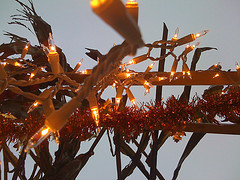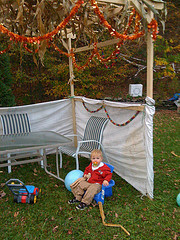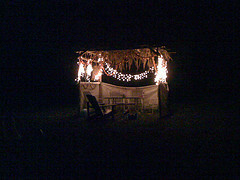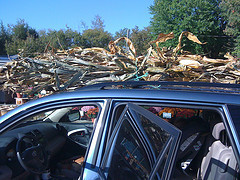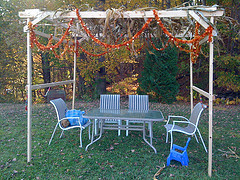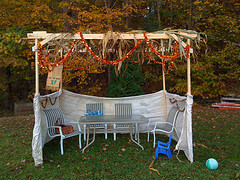Rachel Barenblat's Blog, page 239
October 21, 2011
Off we go!

Back in July, when I began planning my first Days of Awe as a pulpit rabbi, I said to Ethan, "We should pick a weekend after all the holidays are over, and find a way to spend that weekend doing something fun together."
We knew already that he was going to be starting his new gig at MIT and would be in Boston half of every week. We knew that his fall was going to feature a lot of extra travel as well, and we knew that his first month or so at MIT was likely to be pretty densely-packed. And we knew that the Days of Awe are a busy time for everyone in my line of work: so many services to plan and lead, so many details to organize, so many hopes and expectations to try to meet. I figured the odds were good that he and I wouldn't get a ton of time for us until his busy start to the semester, and my busy High Holiday season, were past.
And then Ethan got invited to speak at yet another conference. This happens with fairly predictable regularity, of course; it's a big part of how he works, these days. But this time the invitation came from a college friend who we haven't seen in years -- and the conference was scheduled right after my long string of holidays (Rosh Hashanah to Yom Kippur to Sukkot, Hoshanah Rabbah, Shemini Atzeret, Simchat Torah) was slated to end. Oh, and the conference in question is in Paris.
"Paris," I pointed out, "would be a fabulous place to spend a weekend together."
So Ethan said yes to the conference (which will happen early next week), and we booked an extra plane ticket and a couple of extra nights at a hotel, and my in-laws graciously agreed to spend these few days staying at our house with our adorably rambunctious toddler, and we are going on a weekend vacation.
One of Drew's favorite things to say is "Off we go!" (Clearly we say this to him when we're getting ready to hit the road, and he has learned to repeat it with great enthusiasm and glee.) So I'll echo our beautiful child and say: off we go! See y'all on the flipside.
October 20, 2011
Sestina for Shemini Atzeret
I haven't been writing many poems lately. (Somehow the Days of Awe are a busy time for working rabbis; go figure.) I wanted to jump-start my poetry practice again, and I've often found that a sestina is a good way to do that. (And I haven't posted one here in a while -- I think the last sestina I posted here was Charge, back in 2009...)
Today is Shemini Atzeret, the "Eighth Day of Pausing" -- day 8 of the 7-day festival of Sukkot, the day when tradition tells us God looks at us, preparing to leave our sukkot, and says "please don't go." The penultimate stanza refers to the change in our daily liturgy at this season; between Pesach and Sukkot we ask for dew, and from now until spring we'll ask for rain, in harmony with the seasonal cycle as it unfolds in Jerusalem.
SESTINA FOR SHEMINI ATZERET
From the heights of Yom Kippur we fall
into the embrace of a world that shakes,
structures so airy and light
they don't hide the autumn gold
of Berkshire hills, the white press of sky.
Funny to think of dwelling in this house:
hardly enough wall to call it a house,
these two-by-fours we hope won't fall,
roof of cornstalks open to the sky
rattling when the wind makes them shake.
Around me the trees are strung tinsel-gold.
I inhabit bright blocks of light.
After these holidays my soul feels light.
I asked to dwell in God's house
all the days of my life; received gold
fields shorn to stubble, apples fallen
sweet when the trunk gets a shake.
Always perfect, always changing, the sky
rolls back day before darkness, sky
over this little house bedecked with light.
I gather willow, myrtle, palm; shake
them clasped with etrog, the house
for that tiny nugget of tart fall
wrapped in nubbly fragrant gold.
It's the eighth day of festival. I shake
to think of God pleading "don't go." Golden
is our time together in this house,
talking face-to-face beneath the sky.
My tallit skirts my shoulders, light
as cornsilk. The leaves fall
as birch and maple shake.
Time to ask for rain from the desert sky,
changing our prayers with the city of gold
where the limestone pinks with early light,
where once upon a time we built God's house
and learned all things must fall.
I shake my lulav beneath the cloudy sky,
bless the One Who creates this gold light
Whose house is in my heart this fall.
October 18, 2011
Three glimpses of Sukkot 5772
Sukkot has been -- as expected -- fairly rainy. But there have still been some beautiful Sukkot moments this year. I'm not sure these snapshots are worth a thousand words apiece, but here are some windows into our Sukkot this year:
Drew sits in the sukkah.
Sukkah by night.
Of course, Drew doesn't sit in the sukkah for long. (He doesn't sit anywhere for long! His first sentence was "We go?" and he uses it often.) But it still gives me a thrill to see my son exploring our sukkah, and the one night when the rain let up and we managed to invite friends over to sit in the sukkah and sip wine and cider was a joy.
Gleanings for Hoshanah Rabbah, Shemini Atzeret, Simchat Torah
At the end of Sukkot come three holidays in rapid succession: first Hoshanah Rabbah, then Shemini Atzeret, then Simchat Torah. On Hoshanah Rabbah we pray for rain and for salvation; on Shemini Atzeret we savor the mystical pause of the 8th day; and on Simchat Torah we rejoice in the wonder of our neverending story.
Hoshanah Rabbah will arise this Wednesday; Shemini Atzeret is this Thursday; and for Reform and Israeli Jews, Simchat Torah is also on Thursday (for everyone else, it'll be on Friday.) I haven't had time/space this year to create any new material on these holidays, but here are some highlights from previous years:
Adonai, open my lips - a Hasidic teaching about the mouth as the gate of prayer, for Hoshana Rabbah, 2009
Hoshanot - a niggun, and a contemporary prayer by Reb Zalman written for Hoshana Rabbah, 2010
A prayer for rain - my own contemporary poem on the themes of the classical tefilat geshem, recited on Shemini Atzeret, 2009
The pause of the 8th day - a Hasidic teaching about what it means to celebrate the 8th day of a 7-day holiday, 2007
Mobius - my Torah poem written for the final Torah portion in the scroll, read on Simchat Torah, 2008 (this poem is also available in 70 faces, Phoenicia Publishing, 2011.)
For more along these lines, you can visit the Hoshanah Rabbah category, the Shemini Atzeret category, or the Simchat Torah category on this blog. Enjoy, and chag sameach / happy holidays!
October 17, 2011
Computers, habits, houses, the moon
There's something a little bit funny about having a computer crash at the start of Sukkot. Sukkot is a festival of impermanence, when we're meant to leave our houses and dwell for a week in fragile huts with roofs through which one can see the stars as they emerge over the week of the moon's waning. And what should happen to me on the first day of Sukkot but the total and unexpected death of my hard drive, forcing me to relinquish the structures of data and habit in which I ordinarily dwell.
Nothing should turn out to be permanently lost; the friendly folks at the Apple store in Albany helped me retrieve the data which was new to my machine since I'd last backed it up, and I hope to have a new computer by the end of this week. But in the meanwhile I'm in a kind of digital limbo, using borrowed technology, constantly bumping up against the realization that some vital piece of data or some unremembered account password is not at my fingertips.
In Tarot, the death card is usually understood as a metaphor for transformation and change. The death of the old brings the birth of the new. Here we are at harvest-time, bringing in the riches of the growing season which has now ended. The spectacular autumn colors which grace our hills at this time of year are already fading, leaves knocked down by our frequent recent rains. We're heading toward the dormant season (in this hemisphere), toward bare trees and cold air. But that period of dormancy is always the prelude to the next period of fertility and growth.
I'm trying to take this amusingly-timed computer demise as an opportunity to step outside my usual ways. What do I really need to bring with me at week's end when I move in to the new "house" of metal and bits? Which of the blogs I habitually read bring richness, delight, new ideas to my life, and which might be cut from my daily routine because they tend to make me angry or sad?
My eldest brother, some years ago, taught me the sentiment contained in Mizuta Masahide's gorgeous haiku as "my barn having burned down, I found I could see the moon." (You can find two translations of the haiku on the poet's wikipedia page to which I just linked.) The collapse of a computer is a kind of barn-burning -- or it can be, at least for those of us whose lives (professional, personal, creative, communal) are so intricately interwoven with the technology we use. Having lost the machine, what moon might I be newly-able to view?
It's the perfect question for Sukkot. Sukkot calls us to step out of our houses, out of our habits, out of our illusions of permanence and stability. To spend one week connecting with others and rejoicing in the outdoors, in the harvest, in the world around us. Maybe by taking a week away from our barns, as it were, we can learn to see the moon without needing a burning-down in order to remind us of just how blessed we always are.
October 11, 2011
Preparing for Sukkot 5772
Cornstalks on the roof of my car.
In years past, we've used our ger -- the small round Mongolian-style house which we and our friends assemble as extra guest space for our annual New Year's gathering -- as the framework for our sukkah. It was lovely: roundish (shaped like a cursive letter samech, if one squinted a little) with a beautiful spoked roof. (You can see photos of several years worth of our sukkot in this flickr photoset, if you're so inclined.) But this past winter, the heavy snows which caused our deck to partially collapse also broke the roof-beams of the ger beyond repair. I assumed that I wouldn't have a sukkah at home this year. I figured I would daven and hang out in the synagogue sukkah instead.
But because Ethan is awesome, he spent Sunday building a gorgeous new sukkah structure, large enough to house the glass-topped table which during the summer season lives on our deck. Drew and I picked up some schach (branches to serve as the makeshift roof) at a farmstand in town, and I drove home slowly with them atop my car. (See above.) Here's what Ethan built, topped with the cornstalks we fetched in town and festooned with autumnal garlands:
This year's sukkah.
I can't wait to spend time in it. (I am resolutely ignoring the weather forecasts which call for rain starting just in time for the festival to begin. It's a week-long festival; surely it won't rain the whole time?) (Well, I live in hope.)
Sukkot has resonated differently for me at different points in my life. After my strokes, I marveled at how the fragility of the sukkah mirrored the way I felt in my own body. When I was pregnant, the impermanence of the sukkah felt like a metaphor for the pregnancy approaching its close, and all the world felt like a flimsy sukkah when I anticipated Drew's birth. I don't know yet what the experience of Sukkot is going to bring me this year, but I'm grateful to have the chance to find out.
With (half-)walls.
There's something very powerful for me about entering into this festival only four short days after the end of the Yamim Nora'im (Days of Awe.) Our holiday season doesn't end with the grandeur of Rosh Hashanah or the soul-searching of Yom Kippur. Both of these are steps along the way to Sukkot, the festival of hospitality and harvest.
Sukkot reminds us that our bodies, our houses, the structures of our lives both literal and metaphorical are impermanent, more fragile than we tend to think -- but it also reminds us that we can (indeed: we must) rejoice even in these most uncertain of circumstances. What a wonderful way to round out our holidays and to enter wholly into autumn (in the northern hemisphere, anyway), this season of transition and change.
For more on this theme, I recommend Reb Jeff's post Building a sukkah in hurricane territory.
October 9, 2011
Ten Days of Awe memories I don't want to lose
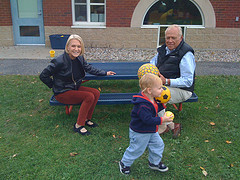
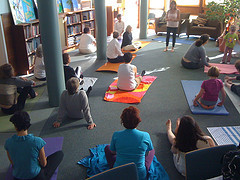
Drew with my parents on Shabbat Shuvah; gentle yoga on Yom Kippur.
1. Seeing my parents who had come all the way from south Texas (and also seeing Ethan!) beaming at me from the kahal as I led my first Rosh Hashanah services as a rabbi. Having them there was amazing: riches upon riches. And, of course, along with that come all of the other sweet memories of my parents' annual Rosh Hashanah visit: watching them enjoy Drew (and vice versa), Drew learning to say a shortened variant of my mother's chosen grandmother name, my father pushing Drew on the swings at a local playground...
2. Delivering the story of Chanah -- the haftarah for the first day of Rosh Hashanah -- without a script, drawing on the sacred storytelling skills I learned last summer with Magidah (storyteller) Devorah Zaslow at the ALEPH Kallah. I loved stepping out from behind the bimah, breaking the invisible plane which sometimes extends between the leader and the community. And I loved telling that familiar story in my own new way, leavened with humor and spiced with my own experience of pregnancy and motherhood.
3. Singing in harmony with my friend and colleague Shayndel Kahn at every opportunity.
4. Bringing some Renewal melodies, some Renewal practices, and a lot of Renewal joy to the community I serve.
5. Plunging into an ice-cold Vermont mountain stream before Yom Kippur and emerging with a whoop! (More here.)
6. Every moment of every amidah we enjoyed on the patio behind the synagogue sanctuary, standing on the tile or walking in the field and at the edge of the wetlands, our silent prayer accompanied by birdsong.
7. Joining maybe twenty people for gentle yoga on Yom Kippur afternoon, before our afternoon services. I had intended to meet in the classroom (I'd warned our yoga teacher that this idea was new to our congregation and that it was possible no one would come but me) but we had to move into the social hall outside the sanctuary because people just kept showing up! It felt wonderful to really enter my breathing and my body on Yom Kippur -- instead of trying to distract myself from the fast, I was able to enter into it in a new way.
8. Leading a guided meditation for our Avodah service on Yom Kippur afternoon: an invitation to imagine oneself as the High Priest engaging in the rituals of this day long ago, from staying up all night relearning the rites of the incense, to the many immersions in living waters, the golden raiments and the white linen ones, placing hands on the head of the bull (feel its power and its strength) and confessing sins, slaughtering the bull swift and sure and collecting its blood in a basin, all the way to the final emergence from the Holy of Holies, the singing and dancing of the community, the feeling of joy in knowing that atonement had truly been achieved.
9. The one Avinu Malkeinu we sang on Yom Kippur. Since Yom Kippur coincided with Shabbat, it's traditional not to recite Avinu Malkeinu until Ne'ilah, the closing service. It is the last thing we do before the very end of the day. Singing it, my voice grew stronger, and hoarser, and suddenly I could hardly hold back the tears. Our father, our king, seal us in the book of life! That was the one moment when I really let the emotions of the day overcome me: knowing that it was almost over, that my last chance to get my prayers and the prayers of my community through the gates of the day was upon me, I was finally able to completely let myself go. So overwhelming, so beautiful -- and then it was over.
10. Breaking my fast with a nip of ice-cold vodka, after the custom of my Russian grandfather Eppie (of blessed memory) -- and the delight of having company in that, as several others laughingly decided to join me! The vodka was like cold crisp fire going down. And as I drank it, I remembered so clearly seeing Eppie in the bar of the house where I grew up, sitting on the tall leather-topped bench, knocking back his vodka before we could go and eat... I like to imagine that somehow, in some way, some part of him could see us, and was pleased.
October 8, 2011
Three poems of teshuvah (a sermon for Yom Kippur morning)
August Rain, After Haying
Through sere trees and beheaded
grasses the slow rain falls.
Hay fills the barn; only the rake
and one empty wagon are left
in the field. In the ditches
goldenrod bends to the ground.
Even at noon the house is dark.
In my room under the eaves
I hear the steady benevolence
of water washing dust
raised by the haying
from porch and car and garden
chair. We are shorn
and purified, as if tonsured.
The grass resolves to grow again,
receiving the rain to that end,
but my disordered soul thirsts
after something it cannot name.
Those are the words of the poet Jane Kenyon, of blessed memory. August may feel like a long time ago now, but try to remember it. Close your eyes if you have to. Can you recall the scent of hay, the sound of summer rain? I love this poem; I love its imagery, "the steady benevolence / of water washing dust," the grass "receiving" the rain in order to grow again. The grass knows what it is doing. But the soul…the soul may be another matter.
"My disordered soul thirsts / after something it cannot name."What do you yearn for? Not water, not coffee, not whatever your bellies are already beginning to crave: what are you really thirsty for? Is there something you cannot name which pulls you forward, which leaves you wondering, for which you cannot help but hope?
Kenyon named her soul as "disordered." I suspect that each of us has a disordered soul. Our spiritual lives are like kitchen tables which become piled with unopened mail. After a while we don't even want to face the sliding stack of envelopes: there are probably bills in there, requests for things we don't want to give. It becomes easier to just look the other way. But not today. Today is the day to sit down at that table, take a deep breath, and take inventory of what's there. Today we put our souls in order at last.
Kenyon's poem is set at the end of the summer, on the cusp of the transition to fall. The trees are sere; the barn is full. The harvest has been brought in, and though the grasses intend to grow, they are headed for their fallow time, their sleeping-time. In just a few days, at Sukkot, we will celebrate our harvest: and for those of us who no longer farm, who most likely don't even make hay, the harvest must be metaphorical. What emotional and spiritual riches can we gather to salt away for the winter which is coming? What might we be able to harvest today, on Yom Kippur, from our time together?
"We are shorn / and purified," Kenyon writes: the grass is shorn and somehow we come away feeling that our excess too has been trimmed away, that the falling rain has made us pure. What is shorn away from us on this day of atonement? What would it take for us to feel pure?
Here's another contemporary poem which I think speaks to what we are doing today. This is Mary Oliver's "The Journey:"
The Journey
One day you finally knew
what you had to do, and began,
though the voices around you
kept shouting
their bad advice—
though the whole house
began to tremble
and you felt the old tug
at your ankles.
"Mend my life!"
each voice cried.
But you didn't stop.
You knew what you had to do,
though the wind pried
with its stiff fingers
at the very foundations,
though their melancholy
was terrible.
It was already late
enough, and a wild night,
and the road full of fallen
branches and stones.
But little by little,
as you left their voices behind,
the stars began to burn
through the sheets of clouds,
and there was a new voice
which you slowly
recognized as your own,
that kept you company
as you strode deeper and deeper
into the world,
determined to do
the only thing you could do—
determined to save
the only life you could save.
"One day you finally knew / what you had to do…" That day is today. We are here in this sanctuary to journey together out of old habits, out of bad patterns, into the new year cleansed and purified. Though our childhood baggage and our recurring issues grab at our ankles, though we hear the plaintive cry of the junk television which would be so easy to flop down and watch and the junk food it would be so easy to flop down and consume, though it might be emotionally simpler to tend to the needs of others (and ignore the needs of our own souls), we will not stop. We have to make teshuvah, to point ourselves in the right direction again.
It is, as Mary Oliver writes, "already late enough." The path on which we walk may not be smooth or level. But the further we go, the easier it becomes to keep going…and the closer we get to our truest selves, to the part of us which is always already at-one with God.
Oliver describes us striding "deeper and deeper into the world," determined to save the only life we can: our own. This is a difficult lesson which I often need to relearn: the only life I can save is my own. No matter how convinced I am that if she would just start exercising, she would feel better—or if he would just try therapy, his life would improve—or if they would just stop trying to control things, they'd find themselves happier—I can't make anyone change. The only life I can save is my own…and the way to save it, says Oliver, is to go deeper and deeper into the world. To resist the temptation of self-absorption, and to plunge into the wide world with my whole heart and my eyes wide open.
Mary Oliver is still with us, still writing poetry. I began with a poem by Jane Kenyon, of blessed memory, who died young, of leukemia. The final poem I want to offer up on this morning's altar is by a poet who did not die young: Stanley Kunitz, born in 1905, who died at the age of one hundred, and who was still writing poetry up until his death.
The Layers
I have walked through many lives,
some of them my own,
and I am not who I was,
though some principle of being
abides, from which I struggle
not to stray.
When I look behind,
as I am compelled to look
before I can gather strength
to proceed on my journey,
I see the milestones dwindling
toward the horizon
and the slow fires trailing
from the abandoned campsites,
over which scavenger angels
wheel on heavy wings.
Oh, I have made myself a tribe
out of my true affections,
and my tribe is scattered!
How shall the heart be reconciled
to its feast of losses?
In a rising wind
the manic dust of my friends,
those who fell along the way,
bitterly stings my face.
Yet I turn, I turn,
exulting somewhat,
with my will intact to go
wherever I need to go,
and every stone on the road
precious to me.
In my darkest night,
when the moon was covered
and I roamed through wreckage,
a nimbus-clouded voice
directed me:
"Live in the layers,
not on the litter."
Though I lack the art
to decipher it,
no doubt the next chapter
in my book of transformations
is already written.
I am not done with my changes.
Kunitz begins: "I have walked through many lives, / some of them my own[.]" Each of us in this room has walked through many lives. Think for a moment about the lives you've touched: family, friends, loved ones and those relationships which challenge you. Think too about the lives with which you have only intersected: coworkers, strangers, that chance encounter on the street or in the hospital hallway. These are the webs of relationships in which we daily, weekly, monthly, annually live out our intention to make teshuvah.
And some of the lives we've walked through, Kunitz reminds us, are our own. The life I knew at fifteen is not the life I knew at thirty. The life I knew before I had a child is not the life I know as a mother. But "some principle of being / abides"—there is something in each of us which remains constant, which makes us who we are.
When we look back on who we have been, Kunitz writes, we see "milestones dwindling / toward the horizon" and "slow fires trailing / from the abandoned campsites." The heart suffers a feast of losses. This life is not easy. But Kunitz makes the conscious choice to revel in it anyway, to be grateful to be alive even though being alive can hurt. And, perhaps in return for that stance, he receives a voice from heaven which tells him, "Live in the layers, not on the litter."
Let me be upfront: I don't know exactly what that means. But here is what I think it means, or at least, what it meant to me this year as we approached Yom Kippur. "Live in the layers, not on the litter." Embrace the different layers of your story, embrace all the different selves you have been and will be. Open your heart to the you of childhood, the you of young adulthood, the you of maturity, the you of old age. Don't take the path of living "on the litter," on the trash-heap of the broken aspirations you've discarded. Go deeper than that.
At the end of the poem, Kunitz writes, "no doubt the next chapter / in my book of transformations / is already written. / I am not done with my changes." I can't think of a better sacred text for Yom Kippur, when our liturgy tells us that the next chapter in our book of transformations is written and sealed on our hearts. None of us is done with our changes.
May our time here together today enable each of us to order our souls and release what needs releasing, to savor the journey we are on singly and together, to delve deep into the layers of who we are and who we have been and who we hope to become, and to trust, and embrace, the changes which are coming.
And we say together: Amen.
October 7, 2011
Unexpected Joy (a sermon for Kol Nidre)
I'm going to let you in on a secret: this is one of my favorite days of the year.
It's not that I enjoy being hungry, or standing up here at the front of a room as my body grows increasingly weary, or reminding myself of all the ways in which I've missed the mark over the year we've just completed. And yes, all of those are part of Yom Kippur.
But those aren't what's truly central to this holiday. Here's what I love: Yom Kippur is the day when we get to focus most on being in connection with something beyond ourselves.
In my love of Yom Kippur, I'm in good company. We read in Mishna Ta'anit that Rabban Shimon ben Gamliel said, "there were no yomim tovim (holidays) in Israel like the 15th of Av and Yom Kippur." On both of these days, the unmarried girls of Jerusalem would go out to the vineyards dressed in white, and call out to the unmarried men to join them.
What makes these two days special? Why were they days of dancing and courtship and joy? On each of these dates, God gave us clear signs that God had accepted our repentance. Yom Kippur is understood as the anniversary of the day when Moshe returned from atop Mount Sinai with the second set of tablets of the covenant, a sign that God had forgiven us for the idolatry which caused the first set to be shattered. On Yom Kippur, we experience our bond with God anew.
Most of the time, we have to balance the desire for spiritual life with the mundane realities of cooking, cleaning, taking the kids to daycare or school. Not today. Today, we only have one job: reaching out beyond ourselves to connect with the source of blessing. Jewish tradition, of course, names that source "God."
The Jewish mystics teach that we connect with God all the time without even knowing it. God's abundance flows down into creation all year long. Wisdom and understanding, mercy and judgement: we find all of these in God, and we find God in all of these. God is a fountain of blessing, and blessing flows from that divine spigot without ever stopping. Ideally, we receive that blessing every day in our ordinary lives.
But over the course of a year, the channel through which God's blessings flow becomes shmutzdik. It gets clogged with our spiritual detritus. Our inattention, our frustrations, our mistakes, the hasty words we wish we could retract: everything we do wrong over the course of a year is spiritual sediment which blocks the conduit through which blessings are meant to flow. Our job today is to clean out those spiritual pipes so that divine abundance can flow freely into our lives again.
At this season we talk a lot about teshuvah, usually translated "repentance" or "return." I like to think of it as a matter of alignment. If blessing flows from God into the world through us, and we get bent out of shape, then the flow doesn't… flow. When we make teshuvah—when we "re/turn again"—abundance can flow into us and through us again. Today is a day for cosmic chiropractic work. Today, we get our spirits re-aligned.
One way that we do that, tradition teaches, is by asking for forgiveness: from our friends, and those who are not our friends; from ourselves; from God. And another way we do that is through reciting the prayers of today's liturgy, beginning with Kol Nidre.
The machzor, the high holiday prayerbook, is a rich anthology of Jewish spiritual writing, from ancient to contemporary. But I know that for some of us, the words can be distancing. The Hebrew and Aramaic may not be comfortable. The metaphor of God as Father and King may not be comfortable. The language of relating to God through yirah, fear and awe, may not be comfortable.
(singing) B'rosh hashanah yikateivun, uvyom tzom kippur yechateimun…
Sound familiar? "On Rosh Hashanah it is inscribed, and on Yom Kippur it is sealed." Who shall live and who shall die; who shall know abundance, and who shall know hardship... What can we do with these words? We've inherited these words from our ancestors, but are they an inheritance we really want?
Here's one way to understand these words of prayer. Try this on: our futures are inscribed not on some cosmic parchment, but on our own hearts. The heart may be solid at Rosh Hashanah—indeed, it would have to be, in order for anything to be inscribed on it. But the heart must be soft like wax in order for it to be "sealed" on Yom Kippur.
It's incumbent on us today to soften our hearts. Find the places where your heart has calcified, and massage those places gently until they become soft enough to change. Our fate is not written in stone on some cosmic tablets on high. Today is the day when we seal our intentions on our own beating hearts.
In every amidah during these Days of Awe we sing Cotveinu l'chayyim: "Inscribe us for life." Usually we understand this to mean that we are asking God to inscribe our names in the Book of Life for the year to come. But the Hasidic master known as the Sfat Emet offers a different interpretation: God is inscribing us, our very selves, with life. God is inscribing life into us. Just as God's words were once inscribed on the tablets which Moshe brought down from the mountain, God inscribes life-force upon and within us.
Or—here's a very contemporary metaphor, courtesy of Reb Zalman—on Yom Kippur, we make ourselves available to God so that God can install new software on the hard drives of our hearts.
At selichot, almost two weeks ago, we sang Ana b'koakh, Holy One of Blessing, please untie our tangles! Today, on Yom Kippur, we ask again: please, God, help us untie the places where we are bound.
Today is a day for taking stock of an intimately personal kind of debt. Not whatever you may owe the bank or Citicard, but what you owe to friends and loved ones…and what they owe to you. Did someone make you a meal when you were sick, or take care of you when you were struggling? Do you have spiritual debts you're not sure you can repay? Or: did you have a need which went unmet, leaving you bound to your perfectly reasonable resentment that no one stepped in to take care of you? Either way—a sweet debt or a bitter one—those feelings can bind you. On this day, with the Kol Nidre prayer, we let those bindings go.
There's deep vulnerability in admitting that we can't always keep the vows we make. Who am I if I can't keep my promises? But once a year it's spiritually important to acknowledge that we don't always live up to our aspirations...and to meet that reality with compassion for ourselves, and for each other too.
All of our unkept promises, and our resentments of the places where others have let us down, are a karmic snarl of tangled connections. "I should have…" "He should have…" "Why didn't they…" It's not good for us to tie ourselves in knots over unmet expectations.
Today we get to experience the joy of untying those knots. Today we relax our physical and spiritual muscles. We prepare to begin again, our spiritual slates clean and ready for something new.
This is a day of tikkun, healing and repair. On the day when we are most willing to face our shortcomings, to own up to what has disappointed us and how we have disappointed others, we are most able to find healing for the places where we are broken. It's a beautiful paradox. Only through acknowledging our baggage, our frustrations, our habitual patterns of inattention and anxiety and overwhelm, may we find ourselves able to let that baggage go.
It's a pretty common rabbinic gesture to parse today's name—the Day of Atonement—as the Day of At/One/Ment. This is our day to remember that we are always, truly, deep down, At One with God.
Are you starting to see why I think of this as a day of joy?
At the end of the Kol Nidre prayer, as the sun is just beginning to set, we recite the words "vayomer Adonai, salachti kidvarecha." "And God said, I have forgiven you, as I have promised."
We're always already forgiven. But because we're human, we won't be able to feel that we've been forgiven until we go through this day of fasting and prayer. We need the experience in order to really assimilate the knowledge.
In my early 20s I studied a martial art called Isshin-Ryu, which means "One heart, one mind." The purpose of karate, our sensei taught, was not learning to kick and punch, nor attaining whatever level of physical fitness might be desirable, but rather the perfection of one's character.
I remember that whenever anyone in our dojo approached a belt test, there was never any question about whether or not we would pass. But we still had to do the work of showing that we had mastered kata, sparring opponents, answering questions, and demonstrating that we had done the work which merited the reward of moving up in rank. We needed the belt test not to prove to sensei that we were ready for a new level of rank, but to prove it to ourselves.
The same thing, I believe, is true of Yom Kippur. God knows we are already forgiven. But we need the experience of Yom Kippur in order to know it for ourselves.
Once upon a time, Yom Kippur was the one day of the year when the High Priest entered into the Holy of Holies, the empty space at the heart of the Temple sanctuary in Jerusalem. In that place, we're told, the Kohen Gadol would receive a new name for God.
The Temple no longer stands, and Kohen Gadol is no longer a viable job description. Today each of us engages in the sacred work of avodah, service, which we enact now through prayer instead of sacrifice. Tomorrow evening at Ne'ilah we'll open the ark for anyone who wants to stand before it in silence. To say what you need to say to God, and to seek a new way of understanding, a new "name for God."
Between now, and that moment about 23 hours away, we download a year's worth of blessing in one dense spiritual package, which we'll spend the whole next year unpacking and making real. Once we have sluiced our spiritual pathways clean, blessing can flow into us—and through us, into the world. We're here tonight not only for our own spiritual benefit, but also because we're called to take the spiritual gifts we receive during these Days of Awe and share them with everyone we meet.
One of my regular blog-readers, a woman I know only as "A.M.," left a comment recently which contained a deep spiritual insight. She deconstructed the name "Days of Awe" into "Days of a 'We'"—days when we and God are in conversation and connection. These are our Days of a 'We,' of being part of an "us" which includes each of us and God, whatever we understand that name to mean. And today is the last of those days.
I want to bless us that we might each experience a Yom Kippur full of connection—real prayer—soft hearts—true release—and at/one/ment. May this be a day when new life is inscribed in each of us. May this be, for each of us, a Yom Kippur of being part of a "We," and in that "We," may we each find joy.
A quick dip before the holiday comes
The drive is glorious: up into Vermont, first on what passes around here for a major road, then onto a dirt road, then onto an even tinier dirt road. The views of furrowed mountains, green turning to red and orange and gold, are breathtaking. Last night there was a frost. The new season is coming.
We pull off the final dirt road at the only house on the road. A woman -- our hostess -- is working in her garden; she greets us merrily and points us toward their "swimming hole," which turns out to be a rushing stream pouring out of an opening in the rock face of the hill. It pools into a little pond, then races down the hill toward wherever its path goes.
We pick our way delicately along the side of the stream until we find the right place to enter. We lay down our towels, face one another, and I offer an impromptu prayer thanking God for this beautiful day, for our companionship on this path, for this amazing natural mikveh. I pray aloud that our immersion offer us the cleansing we need in order to enter this solemn day of connection with our hearts open and ready to receive.
And then we pile our clothing on the riverbank and, shivering, step into the stream. Oh, it is cold! As I move further into the stream, my feet are rapidly becoming too cold for comfort. The thought flits through my mind -- as it does every time I'm blessed to do mikveh outdoors before Yom Kippur -- that my grandfather, of blessed memory, might have mixed feelings about my participation in this ritual outdoors at this time of year!
I take three halting steps, decide that the water here is deep enough, take a deep breath, and plunge into a prone position, all of me beneath the water. When I emerge I whoop. I make my way to the mossy riverbank -- and now the outside air which felt chill, before, feels surprisingly warm and comfortable in comparison with the very cold water in which I just immersed.
The autumn sunshine is glorious. My hair is wet. I have socks to warm my feet. I've done my best to let go of the emotional, spiritual, and karmic baggage of the year which just ended. I feel ready to go home and shower and put on my whites, ready for the davening and singing ahead, ready for whatever may come.
Wishing all who read this a גמר חתימה טובה / g'mar chatimah tovah: may you be sealed for a good year to come!
Rachel Barenblat's Blog
- Rachel Barenblat's profile
- 6 followers


